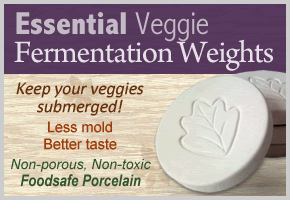http://vimeo.com/84160308
Lacto-fermentation is the predecessor to modern-day canning or preserving… the way our ancestors and traditional cultures preserved foods..You probably know some of these foods – sauerkraut, yogurt and pickles… just to name a few. These foods were traditionally lacto-fermented. Today the commercial versions of these products are not lacto-fermented like our ancestors did. Which is not so great for your body since these are considered "dead" foods. Do you remember watching Mom or Grandma do canning at home with mason jars? Most of us have see that. Remember how she would have to boil all the jars and anything that might touch the food. She did this to avoid the food from getting contaminated with some unhealthy bacteria. What is lacto-fermentation?The process of lacto-fermentation happens when the starches and sugars found within vegetables and fruits are converted to lactic acid by friendly bacteria. Lactic acid is a natural preservative that inhibits the growth of putrefying bacteria. Fermented foods generally have to be stored at temperatures below 50 degrees, ideally closer to 40 degrees for longevity. Root cellars or basements were common in the past, but today most homes don’t have these options, so you will have to use the refrigerator. Sauerkraut, pickles and yogurt are not the only things that can be fermented. Options are endless. How about salsas, onions, carrots, asparagus, peppers, even condiments like homemade mayonnaise, ketchup, mustard, and more. Just about all vegetables can be fermented. Lacto-fermentation VS. "Canning"
Why bother with fermented foods?Lacto-fermentation softens the tough cellular walls of vegetables, making them easier to digest. During this process vitamin levels are also increased. Wait that’s not all…. just one serving of lacto-fermented foods can contain 10x the probiotics of your average probiotic supplement.
Doctors tell us that 80% of our immune system is in our digestive tract. Our immune system controls aging, disease fighting, and the production of many enzymes and chemicals. Lacto-fermented foods boost the digestive tracts’ flora… this could influence our body’s health in every aspect of our lives! Continue to Lesson 4 – Methods & Tools—>
|
|
...obtaining better health with God foods
Disclaimer
The nutritional advice provided through this website is intended to educate individuals about diet and a healthy lifestyle approach. No advice provided is intended to diagnose, cure, or prevent any disease; or be construed as a substitute for medical attention. Individuals with a specific medical condition or concern should seek advice from a physician.
Copyright © 2016 Cooking God's Way · License & Usage · Disclaimer & Privacy Notice · Shipping & Refunds · Affiliate Program





